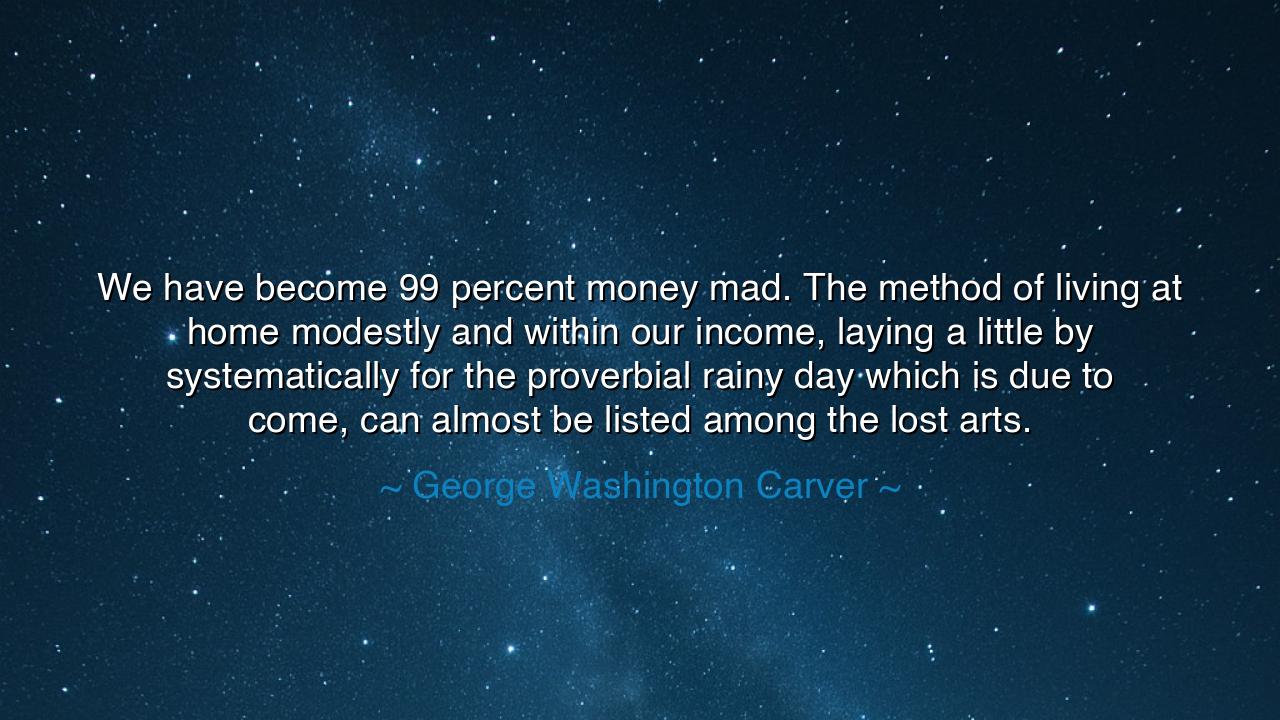
We have become 99 percent money mad. The method of living at home
We have become 99 percent money mad. The method of living at home modestly and within our income, laying a little by systematically for the proverbial rainy day which is due to come, can almost be listed among the lost arts.






The words of George Washington Carver — “We have become 99 percent money mad. The method of living at home modestly and within our income, laying a little by systematically for the proverbial rainy day which is due to come, can almost be listed among the lost arts.” — echo through time like the voice of a prophet calling humanity back to sanity. Spoken in an age of industrial awakening, yet resonant in our own, these words remind us that greed has no era, only faces that change. Carver, a man of humble birth and boundless intellect, saw clearly what few dared to name: that in our pursuit of wealth, we have forgotten the gentler wisdom of contentment. His lament is not of poverty, but of the loss of restraint, of the quiet art of living simply, wisely, and gratefully.
Born into slavery and rising through hardship to become one of the most revered scientists and teachers of his time, Carver understood the true measure of wealth. It was not coins or possessions, but the capacity to live well with little, to find abundance in purpose rather than in profit. When he spoke of a people “money mad,” he was warning not only his contemporaries but all future generations of a sickness that consumes the soul — the belief that one’s worth is bound to one’s wealth. For Carver knew that riches without peace are but gilded chains, and that the freedom of the spirit comes only when one masters desire, not when one feeds it.
The ancients too knew this truth. The philosopher Epicurus, often misunderstood as a lover of luxury, taught instead that happiness comes from simplicity — from friendship, reflection, and modest living. “He who is not content with little,” he said, “will never be content with much.” So too did Socrates proclaim, “He is richest who is content with the least.” Like them, Carver warned that the art of living modestly is not weakness, but strength of soul — the power to stand against the restless tide of excess. It is, as he calls it, a “lost art,” because it requires mastery of the self, and in every age, self-mastery is the rarest skill of all.
Consider the story of Warren Buffett, one of the world’s wealthiest men, who still lives in the same modest home he purchased in 1958. When asked why, he replied that happiness does not multiply with square footage. Though surrounded by wealth, he remains guided by discipline and moderation — principles that Carver would have recognized as the antidote to money madness. Buffett’s simplicity is not deprivation but freedom — the kind that comes when one’s life is ruled not by craving, but by clarity.
Carver’s warning about saving for “the rainy day” also carries timeless wisdom. He does not speak only of financial preparation, but of spiritual foresight — the readiness of heart and mind for the inevitable storms of life. Those who live only for today, spending all they have and wanting more, find themselves helpless when adversity comes. But those who live with prudence, setting aside not only money but time, wisdom, and gratitude, endure the trials of fate with grace. For life is a cycle of seasons — and those who plant in spring will have food in winter, while those who chase luxury in summer will starve when the cold arrives.
There is also a quiet heroism in Carver’s vision of modest living. To live within one’s means in a world that glorifies excess is an act of rebellion — a declaration of independence from the tyranny of vanity. The world may call it smallness, but in truth it is greatness, for it takes more strength to resist temptation than to indulge it. The man who lives modestly is free to give, free to rest, free to think, and free to love — for his heart is not cluttered by endless wanting. Such a man may own little, but he possesses peace, the most precious wealth of all.
Let this then be the teaching for our time: do not be swept away by the madness of money. Work with diligence, but do not worship gain. Save with wisdom, but do not hoard in fear. Learn again the lost art of living within your means — of finding joy in the simple, the useful, and the true. Build your life not on possessions, but on principles. And when you have more than you need, remember that the highest form of wealth is generosity — the ability to give without counting the cost.
For as George Washington Carver reminds us, the world’s riches are fleeting, but the wealth of a disciplined, grateful heart endures forever. Let us, then, reclaim this forgotten art — to live modestly, to give freely, and to save wisely — so that when the rains come, as they always do, we may stand firm, not with trembling greed, but with the quiet dignity of those who have mastered both their labor and their lives.






AAdministratorAdministrator
Welcome, honored guests. Please leave a comment, we will respond soon